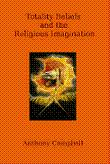(2008)
 Review: Anthony Campbell. 2008. Totality Beliefs and the Religious Imagination. New York: Lulu. 200 pp.
Review: Anthony Campbell. 2008. Totality Beliefs and the Religious Imagination. New York: Lulu. 200 pp.
Though some nonbelievers lack interest in religion, those of us who read and write books skeptical about the supernatural must have some fascination with the subject. Typically this means that we like arguments. We collect contradictions in scriptures, absurdities in God-concepts, and scientific implausibilities in supernatural claims. We assemble our reasons and arguments, and expect the result to be convincing to rational people.
How most people respond to religion, however, clearly has little to do with arguments. It is hard to get beyond accidents of birth, networks of trust, and stories that give us templates for morality and meaning–hard, at least, only with dry, abstract arguments. Indeed, even as skeptics, how we approach religion has as much to do with temperament as with arguments. Even those of us who agree that supernatural beliefs are most likely mistaken differ. We alternatively consider supernatural beliefs a puzzle, a menace, or beautiful falsehoods from which we part with regret.
Anthony Campbell’s short and accessible Totality Beliefs and the Religious Imagination illustrates a temperament rather than providing exhaustive arguments. Campbell has arrived at a position where he thinks that the supernatural is not real, but there is no rancor in his view of religion. He does not treat supernatural convictions as a straightforward mistake curable by a steady application of common sense. Nor does he think that religion is invariably an evil. And even though he has come to think that religions involve too many false beliefs, he thinks that there are too many important questions entangled with our religious traditions to just cast them aside.
I should add a disclaimer here. I happen to share Campbell’s temperament. In fact, I am one of the writers Campbell cites as having a view of religion close to his own. So I must have been predisposed to enjoy the book. Nevertheless, enjoy it I did, and I think it is an example of a kind of skeptical literature that deserves more attention.
I especially like Campbell’s autobiographical approach to religion, where he explains his religious journey throughout his life. This gives him an opportunity to present some arguments, but more importantly, to put these into context and tell the reader why those arguments moved him. The result is not so much a philosophical meditation as a story. And such a story is powerful in its own way. Reading it is like listening to the wisdom of a thoughtful person who has had interesting experiences in a long life. Because this wisdom is based on an individual’s experience, it is to a certain degree personal. It may not always be easy to generalize and make into an abstract argument. But I find it fascinating and valuable nonetheless.
Campbell begins and ends his book with philosophical reflections. In between, he tells the story of how he grew up as a Roman Catholic and later began to have doubts. He then got involved with the transcendental meditation (TM) movement in Britain from its earliest days. His observations about TM and the Maharishi Mahesh Yogi are fascinating. Campbell even wrote a book or two in the early 1970’s supporting TM, but he began to have problems and doubts, and eventually drifted away. Yet he retained an affinity to New Age ways of thinking, continuing to explore different forms of mysticism, even practicing alternative medicine alongside his career as a medical doctor. Campbell’s experiences help the reader understand the environment of many modern spiritual seekers who may have become disenchanted with traditional organized religion, yet still sought a magical dimension beyond worldly existence.
Retired since 1998, Campbell now describes himself as having a naturalistic view of the world. He is no longer convinced by miracle stories, and he has found his own ways of letting go of supernatural views and of striving to be a good person without religion. Refreshingly, Campbell makes it clear that he cannot claim absolute certainty. His experience, including the reasons and arguments that persuaded him, led him to increasing skepticism about supernatural beliefs, but he is aware that some final confidence is unattainable.
Copyright ©2008 Taner Edis. The electronic version is copyright ©2008 by Internet Infidels, Inc. with the written permission of Taner Edis. All rights reserved.

